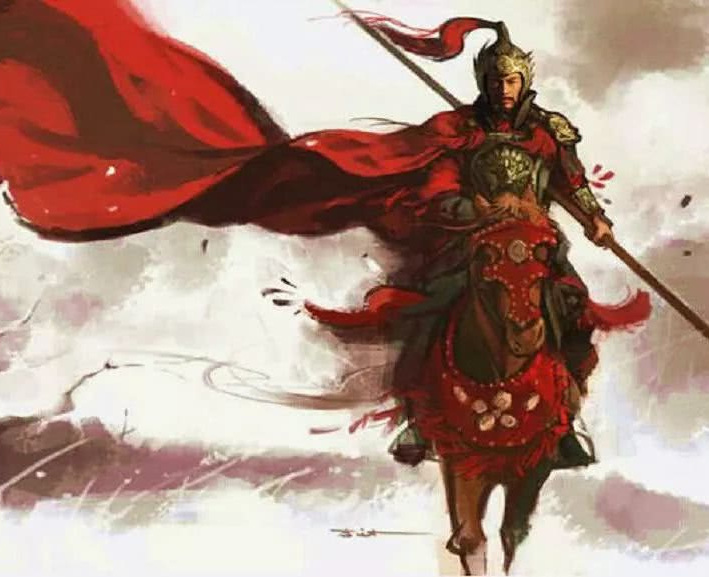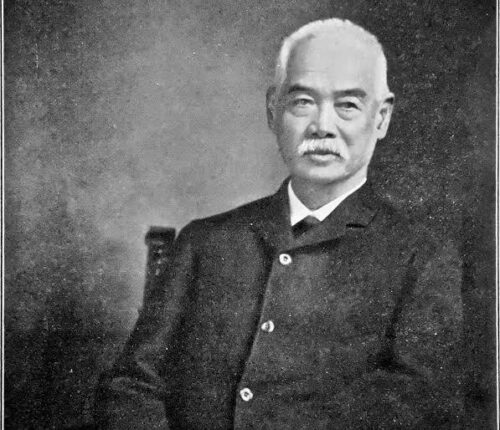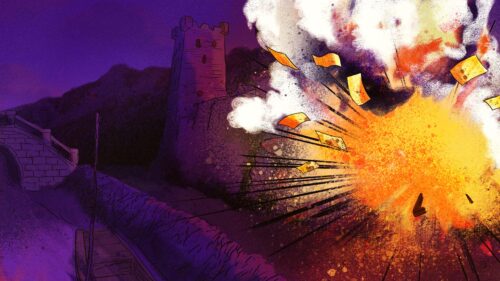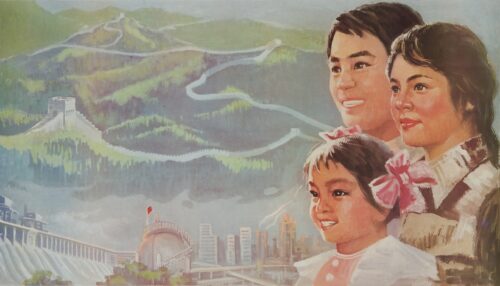This Week in China’s History: January 27, 1142
Near the banks of West Lake in Hangzhou is a site of pilgrimage, a destination for Chinese patriots since the 12th century. Given the tomb’s patriotic status, it is surprising to note that the man honored there — General Yuè Fēi 岳飛 — was imprisoned and executed for treason. But within a decade of his death, the verdict against him was overturned, and ever since, his story has been entwined with the nature of patriotism, loyalty, and nation.
On January 27 (or maybe January 28), 1142, Yue Fei was killed, framed by corrupt government officials. Over the course of nine centuries, Yue Fei has become one of China’s best known legends, an exemplar of moral and political rectitude and a tool for advancing agendas. And like all the best legends, the story of the story itself is at least as interesting as our hero’s biography.
(A word about dates. It should be obvious that the designations “1142” or “January 27” would have held no meaning in Song China. For that matter, I am using the Gregorian calendar, which didn’t even come into existence until 300 years after the Song dynasty fell. Those living at the time would have understood Yue Fei as having met his fate on the 29th day of the 12th month of the 11th year of the Shaoxing era of the Southern Song dynasty. The Common Era, based on the Christian calendar, was adopted in China starting January 1, 1912; prior to that, dates in China would have been given in terms of the year of an emperor’s reign. And, prior to the Ming and Qing dynasties, emperors could have multiple “eras” within their reigns, which would reset the calendar. To enable the kinds of comparisons this column trades on, I convert Chinese dates to the Gregorian calendar of the Common Era. This is a problematic practice, as translation always is, and there is an unavoidably colonial aspect to it, but it is my hope that the convenience enables comparison and improves mutual understanding.)
Yue Fei was born in 1103, in what today is Henan province. So great is his celebrity that even mundane details of his life are difficult to assess: did young Yue Fei and his mother survive a devastating flood in a terracotta jar? Perhaps, but the cliche of a savior spared by divine intervention is hard to take at face value.
One of Yue Fei’s most unlikely moves was his choice of career: he entered the military when military prestige was at a low point. China’s armies had not fared well. To quote the title of Morris Rossabi’s influential book, this was the time of “China among equals.” I have already written about how our notion of China as a single, unchanging empire is off, and this era illustrates that vividly. The area that is today’s PRC was divided among dozens of different states, and the “official” Chinese dynasty during the 12th century, the Song, was by no means the most powerful, especially in comparison to northern neighbors the Khitan Liao and Jurchen Jin, both of which had taken large swathes of territory from the Song. Song treaties acknowledged the Jurchen as their superiors, evidence of plain political reality.
Yue Fei had joined the fight against the Jin as a young man, and took part in the successful defense of Nanjing and Hangzhou, in 1130, and other campaigns. Yue Fei rose to the rank of general, and under his command Song troops were close to avenging one of their most stinging defeats, the loss of their former capital, Kaifeng. The Jurchens wanted peace, but why would the Song give them that when they were verging on a great victory?
At this point the story turns sinister.
Traditionally, the villain is Song minister Qín Huī 秦桧. He had been captured by Jurchens years earlier, along with the Song emperor Qinzong and many members of court, in an incident that led to the loss of northern China, including the capital now within reach of recovery. Miraculously (and suspiciously), Qin Hui escaped from the Jurchens and reestablished himself at the Song court, serving as chancellor to the emperor Xuanzong while Yue Fei led the Song forces against the Jurchens. Rather than allow the Song armies to pursue their victory and retake Kaifeng, Qin Hui pushed his emperor to negotiate.
Complicating matters, the emperor’s father, who had been kidnapped in the same raid as Qin Hui, was still held in Kaifeng. Some think that capturing the former capital might lead to his release and spark a struggle for legitimacy at the top of the Song dynasty. Might the emperor have been less than enthusiastic about having a rival for his throne?
Whatever their motives, the emperor and Qin Hui reached a treaty with the Jurchens in 1142, but three generals, whose support was needed, opposed it. Two of them succumbed to bribes; the third, Yue Fei, refused.
Unable to corrupt Yue Fei, in the standard telling of the story, Qin Hui convinced the emperor that Yue Fei had seditious intentions and the general was recalled. Accused of treason, Yue Fei was either killed in prison, ambushed and murdered on his way to face charges, or sentenced to death and executed.
Almost immediately, Yue Fei was considered a victim of foul play. His reputation did not square with the charges against him. The entire nation mourned, we are told. Yue Fei was officially rehabilitated in 1162, and Qin Hui, who died in 1155, was made the traitor in the story. In a powerful piece of public art, Qin Hui, his wife Lady Wang, and two of their aides are sculpted in iron, hands behind their back, kneeling eternally before Yue Fei, asking forgiveness for their treachery — and bearing the indignities of visitors, who may spit or curse at the statues.
Historian Marc Matten has traced Yue Fei’s legacy in subsequent centuries, showing, again, how history is shaped by both the events of the past and the concerns of the present.
For centuries after Yue Fei’s death he was not seen as the central figure in this drama, although he was widely admired, especially in his ancestral lands. Loyalty and service, not ethnic nationalism, were the key values to be learned, especially when China was ruled by the Mongols, who succeeded the Song. The story was important, but emphasized the treachery of Qin Hui, not the heroism of Yue Fei.
Not until the mid-15th century did Yue Fei’s popularity surge. In the 1440s, Mongols breached the Great Wall, routed some Ming armies, and captured the emperor, events closely matching the times of Yue Fei. In response, Matten writes, Yue Fei temples and shrines sprang up across China. Now on display was not the importance of loyalty to one’s ruler, but ethnic nationalism and a hero who defended China against outsiders, as the Ming emperor now implored his subjects to do.
In the subsequent Qing dynasty of the Manchus, who descended from the Jurchens Yue Fei had opposed, the loyal general’s image was potentially troublesome. The Kangxi emperor, eager to cultivate Chinese patriots, renovated Yue Fei’s mausoleum in 1715, but the more paranoid Yongzheng emperor removed Yue Fei from the list of state heroes altogether. Subsequent Qing emperors reinstated him, emphasizing Yue as a paragon of loyalty, not a warrior against invaders.
In the 19th century, anti-Manchu, Han Chinese nationalists seized on Yue Fei to evoke the patriotism they sought to free China from the Jurchens’ descendants, making Yue Fei a protean hero of the 1911 republican revolution.
But once the revolution was won, Yue Fei again became controversial. As I wrote last month, the notion of “China” is complicated. Like other multi-ethnic nation states — the United States is one example — China faces a challenge trying to come up with a national narrative, and national heroes, to fit its multinational composition. (Consider Frederick Douglass’s “What to the Slave is the Fourth of July” or the controversies over Columbus Day.) Yue Fei’s status as a hero of the Han Chinese does not fit with the PRC’s cosmopolitan self-image: you don’t need to be Han to be Chinese, and Han and non-Han have long been allies, the official story now goes. But, when today’s borders are projected back onto the 12th century, Yue Fei is suddenly not fighting against alien invaders, but against other Chinese, and no longer a national hero.
Scholar Nimrod Baranovitch has written about 2002 policies that eliminated Yue Fei as a national hero in Chinese history textbooks: “The long-held view that Yue Fei had defended China against foreign invasion was no longer acceptable because Yue Fei’s enemies, the Jurchens (Nüzhen), are considered today to be members of the Chinese nation.” This is part of a decades-long trend to maintain political unity in the face of ethnic division, in this case by projecting amicable connections between Han and non-Han far back into the past.
That struggle notwithstanding, Yue Fei remains for most Chinese a hero, but the challenge about what kind of hero remains, both in Chinese and in English. The very first line of Yue Fei’s Baidu encyclopedia entry defines him as “a national hero”: 民族英雄 (mínzú yīngxióng), where “minzu” might mean nation and make Yue Fei a hero of China, or might mean ethnicity and make Yue Fei a hero of the Han people.
These 21st-century concerns are now part of 900 years of honoring Yue Fei — and spitting on Qin Hui — on the shores of West Lake.
This Week in China’s History is a weekly column. Note: The 16th paragraph has been edited for clarity about the context of the renovation of Yue Fei’s mausoleum.






